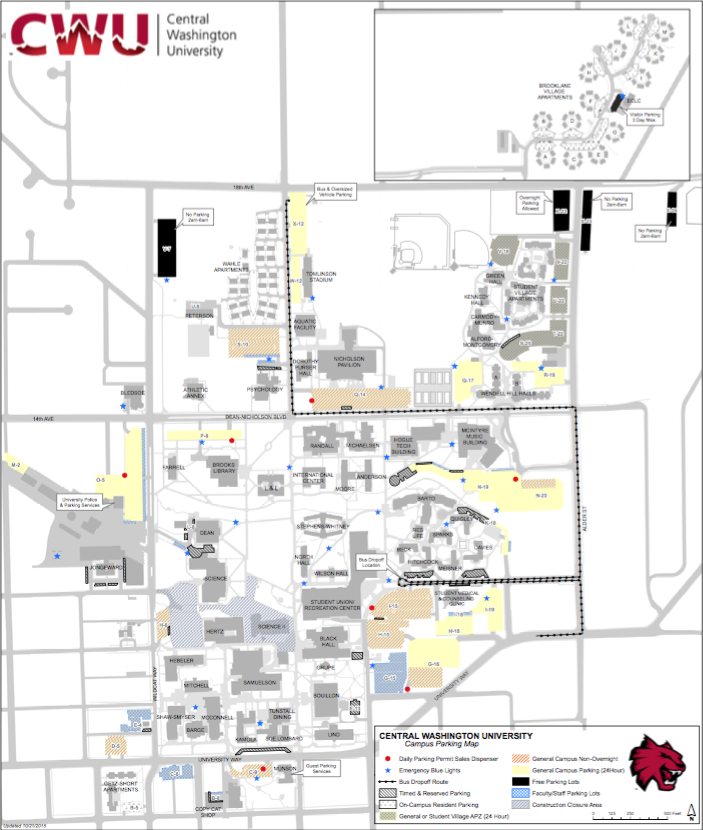CWU parking: Is it a problem or a matter of convenience?
May 26, 2016
In March, Nick Hansen, senior chemistry student at Central Washington University, decided he would try an experiment – a test to measure how much time would pass before he could find a parking spot.
His tools? A stopwatch and a ’97 white Volvo. He left his apartment at 10:45 a.m. After a two minute drive to campus, he was ready to begin.
He circled lot after lot, eyeing people who looked like they were returning their cars, and nudging his way into queues. At 11:03 a.m. he had done it – he found a parking spot. And it only took 16 minutes.
But Hansen wasn’t alone that day. He and hundreds of other students were (and are) contributing to one of CWU’s largest daily social experiments: How to find a parking spot before your professor marks you tardy. He failed by three minutes, but that hasn’t stopped him and other students from trying.
“Every time I drove down, it was kind of like playing with fire,” he says.
A campus scorn
If you search “CWU” and “parking” on Twitter, you’re almost guaranteed to see at least one tweet a day about a bad parking experience.
“Parking in 30 minute parking and accepting the ticket just because parking is that difficult #Cwu,” one student tweeted on May 19.
Thirty-eight students participated in a poll on the Observer’s Twitter page, and zero percent said parking was “Fabulous,” 18 percent said it was “Meh” and 82 percent said it was “A dark pit of despair.”
“Is there a problem with parking? You could say that there is,” says Eric Twaites, a campus police captain and the head of parking services.
He’s only been in charge of parking services for about 8 months. But in that short amount of time, Twaites has noticed one glaring constant: convenience.
“It’s not so much a lack of parking, it’s a lack of convenient parking,” he says. “Parking is not a glamorous topic.”
According to the CWU parking map, the lots with the largest amount of spots are located north of campus on Dean Nicholson Blvd., where most classes aren’t. And a large portion of off-campus student housing is located north of campus, on E 18th Avenue and onward.
It can take anywhere from 15 minutes to 20 minutes to walk to campus from these areas. Meaning, many students would prefer to drive to class. And naturally, they want to park near the heart of the campus, Twaites says.
During “peak hours” – from about 8 a.m. to noon – most lots on the south side of campus can fill completely, while the north lots have many vacant spots.
It’s during these peak times that many students can feel cheated. While parking services does sell more passes than spots, Twaites says, not every student is parking every day.
Another common complaint is the amount of 30-minute parking spots CWU has, despite the fact that there are only 74 on campus. Many students use the 30-minute spots when they can’t find a general spot, and will usually return to find a ticket on their car.
While the cost is only about $15, for many students, these can add up quickly.
“I’ve gotten probably about seven tickets,” Hansen says. “It really is crazy because I’ve basically almost paid for two [quarters of] parking passes.”
How to fix it
A solution to the problem isn’t as simple as most students think, Twaites says. Many lots on campus never fill up completely, even during peak hours. It’s the worst offenders – the convenient lots – that are the source of students’ scorn.
And it’s not as easy as just creating more lots, since most of the space on campus is already accounted for.
One idea toyed around with by students is building a parking garage on the vacant fields that flank the campus, complete with a shuttle.
But Twaites questions whether students would actually enjoy a large concrete building dominating the skyline.
“Is that really the focal point of what you wanna see when you come to Central, is a cool parking garage?” he says.
Other suggestions Twaites has heard include taking away parking passes completely and instead making parking a mandatory fee similar to the tech and athletic fees students pay each quarter. While that would help curb parking tickets, he says it could also lead to less spots overall, since if everyone could park for free, everyone might park for free.
While the university figures all of that technical stuff out, some students have taken matters into their own hands (and feet) and have started walking or riding their bike.
Hansen is one of those students, and now he no longer deals with the headache of finding a spot before class. But that doesn’t stop him from sharing his opinion.
“Parking?” he says. “It really sucks.”



